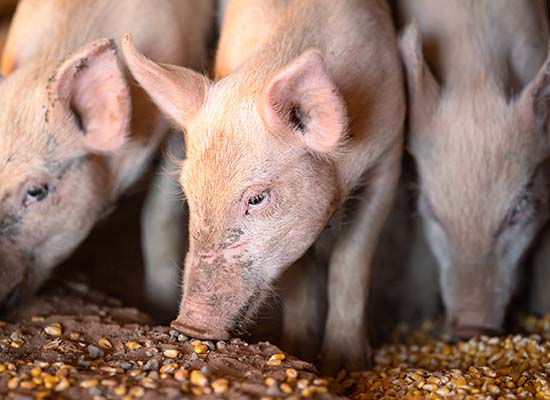
Iowa Ag Biotech Company Sets Up R&D Center in North Carolina

Mazen Animal Health, an Iowa startup company that’s developing corn-based oral vaccines for animals, has selected North Carolina as the home for its research and development headquarters.
The company has leased office, lab and greenhouse space at Alexandria LaunchLabs in Research Triangle Park, said Jennifer Filbey, Ph.D., Mazen’s chief executive officer and co-founder.
“I think (the Research Triangle area) is a great place to put our R&D,” said Filbey, who is familiar with the region from having previously lived and worked in it. “I can’t say enough good things about the atmosphere there, the support and the entrepreneurial spirit.”

Mazen recently hired a leader and two scientists to work at the R&D site, with more staff to be added this year, Filbey said.
Tracy Raines, Ph.D., a local scientist and executive with startup experience in agricultural biotechnology, was named vice president of R&D. In addition to her work in plant molecular biology at the University of North Carolina at Chapel Hill, where she earned her doctorate and was a postdoctoral researcher, Raines led or supported R&D programs at three ag biotech companies in the Research Triangle region: Paradigm Genetics, Athenix and AgBiome.
When Mazen secured Raines for the job, “it was a no brainer to set up (R&D operations) in North Carolina,” Filbey said.
Raines already has hired two Ph.D. scientists, bringing the company’s total staff count to 10.

“Given the proximity to multiple wonderful universities as well as numerous agriculture biotech companies, RTP is the perfect location to build out our team,” Raines said. “The talent pool is rich with innovative scientists to propel our technology forward – like our first two hires, Jelena Zaitseva and Jun Cao. Their deep expertise will be critical in deploying innovative, cutting-edge research as we continue establishing our world-class R&D team.”
Zaitseva is a senior principal scientist and biochemistry lead. She has more than 15 years of experience leading and collaborating with cross-functional teams to plan and execute R&D projects involving optimizing commercial-level protein expression in plant systems at BASF, Bayer Crop Science and Athenix Corp.
Cao is a senior scientist for plant transformation. He has over 35 years of experience in plant tissue culture and transformation in academic and industry environments, including Athenix, Bayer and BASF. He is a pioneer of novel soybean transformation techniques resulting in one of the first soybean cyst nematode-resistant traits in development.
“We’ve already established a super team, and we’ll be growing it,” Filbey said. “As we grow, we’ll also be looking for space for our nursery or pilot fields. We’re putting down a footprint in North Carolina.”
Backed by $11 million in venture capital
That footprint is financed by a Series A round of venture capital that netted Mazen over $11 million in 2022. The round was led by Fall Line Capital and joined by all of the earlier seed-stage investors, including Next Level Ventures, Kent Corporation, Ag Startup Engine, Ag Ventures Alliance, ISAV and Summit Ag. Several new investors, AgFunder, 1330 Investments, Addison Laboratories, SLO Seeds Ventures and Cal Poly Ventures, also participated in the financing.
“We have an incredibly supportive group of investors who believe in the promise of Mazen technology,” Filbey said. “As we build our presence in the area, we look forward to adding North Carolina investors to our group as well.”
Paul Ulanch, Ph.D., MBA, senior director of focused initiatives in the agriculture sector development group at the North Carolina Biotechnology Center, welcomed Mazen’s selection of North Carolina for its R&D center and said the company is a good addition to the state’s large and growing ag-biotech community.
“Both crop science and animal health are strengths in the state’s ag tech ecosystem, and Mazen is in both,” he said. “The company’s science is to leverage corn as a feed-delivery system of antigens. This in turn will improve the health of production animals that are important for North Carolina’s agricultural economy.”
Ulanch noted that Filbey presented at the 4th Ag Biotech Entrepreneurial Showcase program, organized by the Biotech Center in 2016, and that NCBiotech staff have communicated with her ever since about resources in North Carolina that could help Mazen.
Engineered corn as vaccine factories
Mazen’s oral vaccines are produced in corn plants using recombinant DNA technology drawn from years of research led by John Howard, Ph.D., Mazen’s co-founder and an expert in recombinant protein production in plants.

Genes coding for the production of antigens – the proteins that give vaccines their protective power against infectious diseases – are inserted in the corn plant’s cells. The antigens are expressed in the germplasm within the corn’s kernels.
The vaccine-laden corn is ground, dried and blended with regular feed corn to the desired dose, and then fed to animals. Giving oral vaccines to livestock and companion animals offers several advantages when compared to the standard practice of manually injecting vaccines using syringes.
There is no stress to the animal, no risk of broken needles in animals and no accidental jabs to technicians. Cold-chain handling and storage of vaccines is not required, and less labor is involved, saving time and money.
As it makes its way through an animal’s digestive tract, the vaccine antigen is released gradually, stimulating the production of neutralizing antibodies – a protective response to infection – in both the mucosal immune system and the systemic immune system, Filbey said. That dual mode of action can provide greater efficacy than injected vaccines, which stimulate only the systemic immune system.
Corn is well suited for time-release vaccine delivery because it contains carbohydrates and enzyme inhibitors that protect vaccine antigens from degrading too quickly in the digestive tract, Filbey said.
Diverse product pipeline
Mazen’s lead product candidate is a vaccine against porcine epidemic diarrhea virus (PEDV), a coronavirus that infects the small intestines of pigs, causing severe diarrhea and dehydration. PEDV is highly contagious and can wipe out herds of newborn piglets and slow down weight gain in sows.
Mazen is conducting efficacy studies of the vaccine in preparation for regulatory approval and product launch. The company plans to grow the vaccine in “several hundred acres” of transgenic corn in California’s San Joaquin Valley this year, Filbey said.
The corn will be shipped to the company’s manufacturing facility in Illinois, where it will be processed, blended and bagged into corn feed for distribution to farms.
Other products in Mazen’s development pipeline include vaccines for porcine circovirus, coccidiosis and salmonella in poultry, rabies and valley fever in dogs, and an undisclosed product being developed in collaboration with Elanco Animal Health, the global farm animal and pet health company based in Indiana.
That product development work will now be done in North Carolina.
“We are just super excited to be establishing R&D in North Carolina,” Filbey said. “It’s a great environment to be in.”
